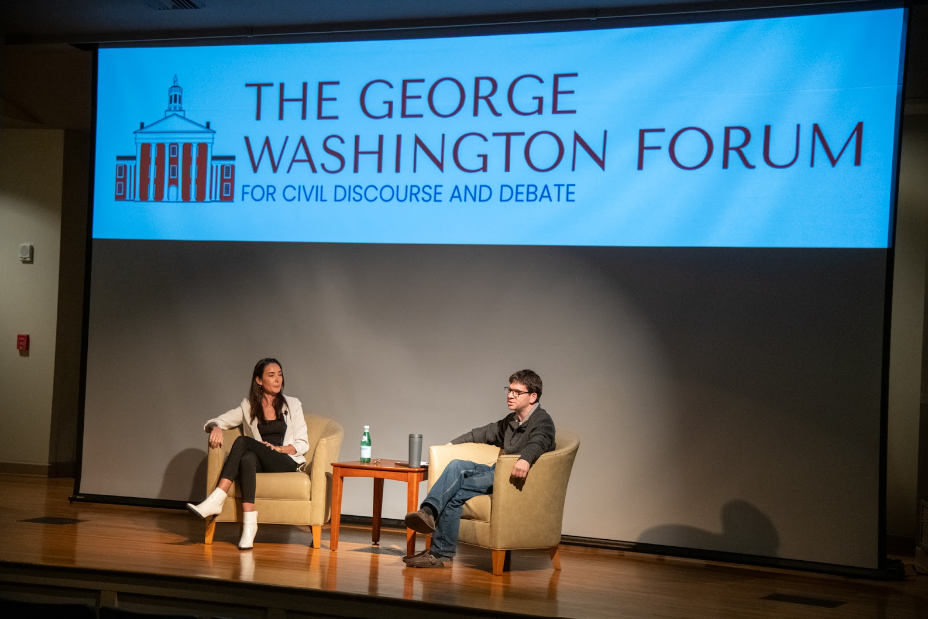Will AI Make Us Rich or Kill Us All?
Will AI Make Us Rich or Kill Us All?
Two panelists answer the climactic question at The George Washington Forum.
(Sam Rad [Left] and W&L’s Professor Schatten [Right]. SOURCE: Elena Lee)
On March 12, The George Washington Forum for Civil Discourse and Debate hosted its inaugural event, entitled “AI: Will It Make Us Rich or Kill Us All?”, which featured W&L’s own Professor Jeff Schatten and Samantha Radocchia, an author, futurist, and technologist also known as Sam Rad.
Artificial intelligence (AI) has significant implications for humanity, Professor Schatten said. “We are in the process of handing over to the next species. … We are creating the next species,” he said. For Schatten, that species is defined by computers.
Sam Rad elaborated. “I think what AI is providing to us now is like the superhuman version of logic or reasoning taken to an extreme, and it'll do that far better than we ever could,” she said.
To illustrate her point, Professor Schatten pointed to what he thinks will be one of the greatest legacies of AI: its impact on genomics. AI can construct things the human mind would never conceive otherwise, according to Schatten.
“We’ve already seen a couple of obscure cancers that have been cured by AI,” said Schatten. “In the past, if you wanted to test an enzyme and how it's going to interact with the human body, you’d have an actual scientist go in and they would test this particular enzyme constructed in this kind of way. Now with AI you can have a billion enzymes created and tested at once.”
The panelists also discussed the impact of AI on education. Sam Rad pointed to a study of how many middle school students are so reliant on autocomplete that do not know how to spell.
Rad noted that this new reliance is concerning to some. However, spelling is perhaps “just not a skill of the future, because our communication becomes telepathic,” she suggested.
(Sam Rad [Left] Addresses the Crowd SOURCE: Elena Lee)
Schatten said that he didn’t necessarily “think someone needs to spell to be able to live a healthy and productive and meaningful life.” He did say that it is important for humans to “think through [their own] thoughts.”
Indeed, with the power of AI and freedom from mundane tasks like spelling, humans can achieve a level of output hitherto unknown, if they know how to enter prompts correctly, he said.
Schatten explained how he harnesses AI to his advantage, fine-tuning his work. However, he noted that he already has “the neural pathways to put [ideas] down on paper.” Schatten worries about the next generation whose “neurological pathways have not been developed.”
(Professor Jeff Shatten [Right] Responds. SOURCE: Elena Lee)
The panels also explored other concerning possibilities.
For instance, they discussed how the Chinese Communist Party uses AI and extensive surveillance to assign individuals a social credit score, creating a new “techno-authoritarian regime.” Schatten was frank, saying that it is scary “what these tools look like when they’re weaponized.”
(Chinese President Xi Jinping. SOURCE: San Diego Union Tribune)
Mac Malambri, ’27, asked about TikTok, its relationship with the CCP, and whether the app may simply be showing people what they want to see. Schatten emphasized the difference between YouTube and TikTok.
He said that YouTube is designed to be a “profit maximizer” while TikTok has a “dual agenda” of both supporting political goals and making money. To illustrate, Schatten referenced TikTok sowing discord in the United States concerning the Israel and Hamas conflict.
Charlie Mlcek, ’25, expressed concern about AI sentience. Schatten admitted that he is much more concerned about humans weaponizing AI. Sam Rad added that there is a “100% chance humans will weaponize [AI]” and emphasized that it is important to be equipped with the necessary protective skills.
(Houthi Followers Hold Mock Drone. SOURCE: The Japan Times)
Schatten highlighted the Houthi rebels in Yemen, who cheaply conduct drone strikes to upend shipping in the Red Sea. He considered the threat of the Houthis to represent the “outsize effect that I think we see with AI.”
“And [what] we see with the modern technology is if you want to be disruptive on a global scale, you can now do it with pennies in a way that you just couldn’t do before,” he said.
According to the panelists, the practical threat of AI could extend anywhere from crippling financial systems and critical infrastructure to biological warfare. Governance “is something we now need to discuss,” Rad said.
Schatten nonetheless assured students that there are plenty of reasons for optimism. They are headed “into the world with a superpower,” and “have the best world to be emerging into.”
Rad stressed that adaptability will be important: “In my career so far, things have changed so quickly that the only skill that has really served me is adaptability.”
Following the panel, Carl Rifino, ’27, said that “it was insightful to hear about what AI is today in relation to us as university students.”
Owen Murray, ’24, the president of The George Washington Forum, said that he “left feeling scared that it could get in the wrong hands and really impact us in a negative way.” But his main takeaway was how he needs to “remain somewhat optimistic and try to leverage it to use it to ensure I live a good, happy life.”






